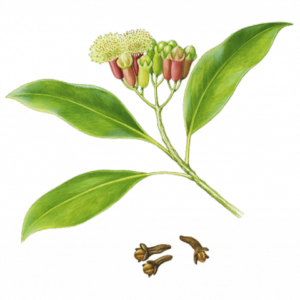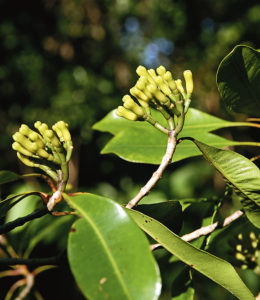
Find out more about the Clove plant of our Aromatherapy Herbarium blog series.

CLOVE
Syzygium aromaticum
(syn. Eugenia caryophyllata)
DESCRIPTION

The clove tree (Syzygium aromaticum) is a member of the Myrtaceae native of the Moluccas (Indonesia) that can reach fifteen metres.
ADVICE
Essential oil of clove must be used diluted on the skin.
DO NOT USE IN
– pregnant or breast-feeding women,
– children under the age of six years (phenols),
– persons allergic to one of the components (eugenol),
– subjects with asthma without the advice of an allergologist before the first use,
– subjects with epilepsy.
RECIPES
Gum condition
Apply to the gums in a massage 1 drop of each of the following essential oils: clove, bay, niaouli, diluted in 2 drops of neutral carrier oil, three to four times daily for one week.
Mouth ulcer or dental abscess
Place directly on the mouth ulcer (or the tooth, in case of dental abscess) 1 drop of essential oil of clove using a cotton swab.
Chill
Mix 2 drops of essential oil of clove with honey. Sweeten your herbal tea with it.
Appetite suppressant
60 drops of EO of Ceylon cinnamon, 60 drops of EO of clove.
Pour the mixture in a brown glass bottle. Remove top and breathe in five times to suppress the desire to eat.
Do not diffuse pure, always combined with other essential oils.

It has opposite, persistent and leathery leaves. The flowers have a calyx that turns bright red on maturity and a pinkish white corolla, forming branched compact cymes. The fruits only contain one seed. The flower buttons before opening are called “cloves”.
Cloves were used by the Chinese well before our times for culinary and medicinal purposes. The “spice route” leading to the “Land of Serica” (China) introduced it to the Romans who used to make edible meat that was often gamy. Plinys criticised cloves and peppers “that they only appealed via their bitterness”. The Greek doctor Askesios did not agree: “Clove oil has a nice smell that helps digestion considerably.” The clove tree was introduced in Europe by the Arabs, however it was the Portuguese who discovered the Moluccas in 1424 who had the monopoly. The administrator of the Ile de France, now Mauritius, acquired some plants and the acclimatised them first on his island and then in the Antilles. The use of clove was often considered a manifestation of insolent luxury: Dante criticised the Sienese in his Inferno “the expensive habit of seasoning with cloves”. All throughout the world cloves are chewed to improve the breath and prevent dental infections.
CULTIVATION AND PRODUCTION
Cloves are harvested before opening and allowed to sun dry until they become dark brown. Indonesia is currently the main clove producer, of which Zanzibar was the world capital, but it dedicates 95% of its production to the manufacture of local cigarettes, kreteks. Madagascar, Tanzania, Sri Lanka and the Comoros export the essential oil, and Mayotte, French “the fragrant island”, is a small producer.
FRAGRANCE
The clear, powerful and spicy odour is familiar to anyone who has visited a dental practice.
EXTRACTION AND YIELD
The essential oil is obtained by distillation. The content of clove essence is very high (150 millilitres per kilogram and more in the dried plant) gives an exceptionally high yield of 13%, i.e. thirteen kilograms of essential oil per hundred kilograms of flower buds.
CHEMICAL FORMULA
The main active components of essential oil of Syzygium aromaticum are first eugenol and then caryophyllene.
MAIN INDICATIONS
Essential oil of clove is antiviral, antibacterial, anti-parasite, analgesic and anti-inflammatory. It is also a powerful anaesthetic, brilliant against toothaches. The eugenol contained in cloves is used in dental anaesthesia which is why its odour immediately makes us think of the dentist’s chair! It facilitates digestion, fights bacterial diarrhoea as well as constipation, and eliminates physical and intellectual fatigue. Its fragrance has the property of staving hunger and was often used to endure the long hours of religious fasting.


Leave a Comment